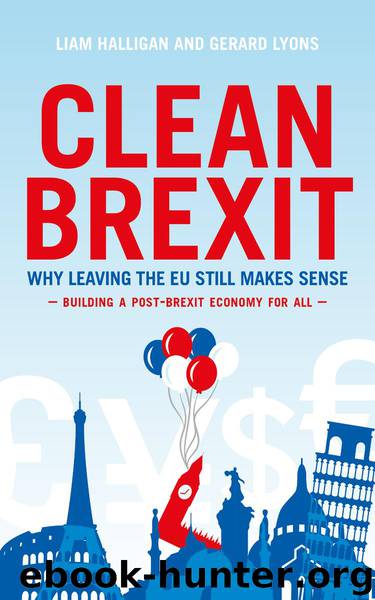Clean Brexit by Halligan Liam; Lyons Gerard;

Author:Halligan, Liam; Lyons, Gerard; [Liam Halligan and Gerard Lyons]
Language: eng
Format: epub
ISBN: 5046625
Publisher: Biteback Publishing
Published: 2017-04-06T04:00:00+00:00
PART IV
THE UK AFTER BREXIT
CHAPTER 8
ECONOMIC AND INDUSTRIAL LANDSCAPE
‘The economy, stupid.’
JAMES CARVILLE, 19911
A vision is needed; leaving the EU will not, by itself, transform the UK economy. The policies we adopt during the Article 50 period, and once the UK has left, are of vital importance. Crucially, outside the EU, we will have a greater ability to set our own policies – to the extent an individual country can, within the context of a fast-globalising world economy.
Brexit should empower the government to devise and implement measures that can help truly to transform the UK economy. Before that, though, there are many areas of policy where Britain will reclaim ‘competencies’ from Brussels. These range from regional policy to state aid. Also, as Britain leaves the EU, we should sharpen our focus in many areas where attention has sometimes been lacking – on things that we should have been doing anyway, and for whatever reason did not. A good example is infrastructure spending, which is vital both to raising productivity and spreading growth across the regions. After March 2019, our politicians will no longer be able to blame Brussels for any problems. Gone will be those tabloid headlines telling us it is all Europe’s fault.
During the exit negotiations, it is quite possible the Eurozone and the broader EU 27 could grow at a faster pace than in recent years, helped by the easy money policy of the ECB and a pick-up in the world economy. This should not make us doubt the benefits of leaving. A cyclical upturn across the Eurozone is long overdue. And while such an improvement would help UK exports, it won’t solve the deep-rooted structural issues facing monetary union.
Both Brexit and the June 2017 general election should be triggers for a fundamental rethink of domestic economic policy-making. Since the 2008 financial crisis, the UK, and much of the Western world, has shown a rather mixed policy record. While more investment is necessary, and there are areas where the state could perhaps play a more active role, there is also a need to restate the case for the market economy.
History has shown, again and again and throughout the world, that the market economy – suitably regulated and tempered – is the only sure route to economic success and rising living standards. The 2008 Lehman Brothers collapse, far from undermining the case for broadly free markets, actually served to strengthen it. When banks are allowed to get so large and complex, in cahoots with captured regulators, that they are too big to fail, that shows market discipline has gone. The global financial crisis happened not because there was too much capitalism, but too little. The UK must fall back on its free-market instincts – making sure markets operate free of ‘cronyist’ restrictions – while maintaining good-quality, comprehensive public services.
Outside the EU, the UK must aspire to be one of the best-performing Western economies – a nation that succeeds on the global stage in both economic and diplomatic terms. To do
Download
This site does not store any files on its server. We only index and link to content provided by other sites. Please contact the content providers to delete copyright contents if any and email us, we'll remove relevant links or contents immediately.
The Rule of Law by Bingham Tom(1323)
The Holocaust: A New History by Laurence Rees(1237)
Political Theology by Carl Schmitt(1191)
The Social Animal by David Brooks(1129)
Restitution by Restitution(1119)
Pirates of Somalia by Jay Bahadur(1117)
A Practical Guide to International Arbitration in London by Hilary Heilbron(1087)
Coercing Virtue by Robert H. Bork(1030)
The Nuremberg Interviews by Leon Goldensohn(996)
Basic International Corporate Taxation by Sebastiano Garufi(931)
A History Of Thailand by Baker Chris(895)
Asian Waters by Humphrey Hawksley(881)
International Trade and Business: Law, Policy and Ethics by Gabriël Moens & Peter Gillies(874)
Blood Profits by Vanessa Neumann(871)
Spring Fever: The Illusion of Islamic Democracy by McCarthy Andrew C(871)
The Global Commons by Susan J. Buck(865)
The Sovereignty of Human Rights by Macklem Patrick(797)
Crimes Against Humanity: Historical Evolution and Contemporary Application by M. Cherif Bassiouni(797)
The Nuremberg Trials: The Nazis and their Crimes Against Humanity by Roland Paul(792)
